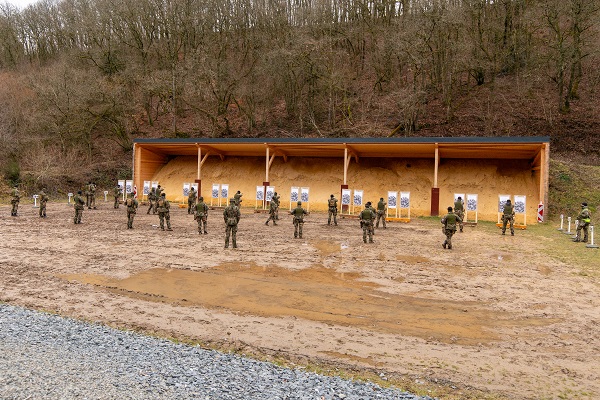 Credit: Luxembourg Army
Credit: Luxembourg Army
Luxembourg's Deputy Prime Minister, Minister of Defence and Minister for Mobility and Public Works, François Bausch, recently presented a project aimed at redeveloping the shooting range at Bleesdall in northern Luxembourg.
This presentation took place on Wednesday 4 October 2023, in the presence of officials from the Public Building Administration and the Luxembourg Army.
The project is part of a broader framework of modernisation of national military infrastructures. Bleesdall's infrastructure dates back to the 1950s and no major renovations have been undertaken since then. According to Minister Bausch, this redevelopment project responds not only to the need for a modern army facing a growing number of challenges, but also to the need to bring the site into conformity following the evolution of shooting techniques within armies and to the legal requirements imposed in terms of health and safety at work.
The construction programme provides for the redevelopment and security of all of the site's infrastructure and helps achieve several objectives, including those related to health and safety but also the development of shooting ranges allowing shooters to practise according to new paradigms in the field. The project also foresees the creation of a maximum capacity of 30 simultaneous shooters on three stands, as well as the provision of multifunctional facilities for different levels of shooters, from beginner to sniper. In addition, the maximum authorised destruction load of shells and regluing munitions will be increased and an administrative zone adapted to the needs of the army with regard to surfaces and functions for instruction, training and maintenance of the site will be developed. It also foresees the deconstruction of the stand used in the past for throwing explosive hand grenades and the redevelopment of free areas with green spaces (about 5,000 m2).
Regarding the architectural and constructive concept, the project provides for a "simple" and "timeless" architectural language of strictly functional constructions. The implementation of new constructions will respect as much as possible the topography of the site and the natural environment. The interior and exterior materials are chosen so that the constructions have high resistance to wear, good ageing over time and ease of maintenance. An energy concept compliance was developed for this project.
Moreover, a perimeter security concept with three levels of protection has been established:
- a first anti-intrusion type security, encompassing the administrative zone, the shooting range zone as well as the shell and ammunition destruction zone;
- a second security perimeter set up around the shell and ammunition destruction zone further away in the forest;
- a third security perimeter indicating the presence of a military site at the land boundaries and along the roads and forest edges surrounding the site.
Concerning the exterior installations, there are plans to renew buried water, waste and rainwater, drinking water and fire water as well as to develop a reservoir for the recovery of rainwater supplying the shoe cleaning station and the exterior water points. The construction of the main circulation surfaces is made of asphalt, the pedestrian paths in front of the administrative building and between the shooting ranges are made of draining paving stones and the surfaces of the shooting ranges are made of gravel.
Minister Bausch assured that the energy and technical concept of the administrative building complies with the standards and regulations in force and provides in particular for good thermal performance and waterproofing of the exterior envelope, technical installations with low energy consumption and own production of electricity and heat.
The project also provides for an installation on the entire site of the RENITA (Réseau National Intégré de Radiocommunication) digital radio network of Luxembourg's security and emergency services.
The army is in charge of managing the site. However, the shooting range is also used by other actors, notably the Grand Ducal Police and the Customs and Excise Agency.
The overall cost of this project amounts to €71,540,000 including tax.








